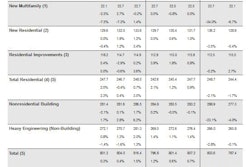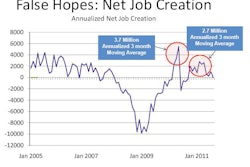The year 2011, whether it's been bad or good, is just about to cross the finish line. And if you're still in the race, you must have made some quality moves to keep your head above water. Good work!
Before you start patting yourself on the back, however, look at what's in front of you. That, my friend, is 2012, which may have more challenges for you to deal with than those 2011 threw at you. Stop and think about it. In 2011, you knew where you were at and you busted your butt to stay one job ahead of the game. It was tough, but you got through it with your hide intact.
Part of your management skills in 2011 pertained to construction equipment – do you fix it, buy a new unit, buy a used unit or just rent what you need on a job by job basis. With the financing restraints being what they were, the decision in some or most cases was made for you when you heard, "Sorry, but you don't qualify."
So here you are at the end of 2011 – with that same equipment you started the year with – considering the maintenance costs you could avoid with a new or newer unit. When you throw in the fact that 2012 deliveries will most likely cost more and have new engines your techs know little about, it makes the decision even harder.
Financing and tax considerations
When you think of equipment upgrades, you must also think about financing and taxes. After attending a leasing seminar recently, I am reminded of the advantages and flexibility leases can provide to equipment buyers.
My main concern with financing today is being able to fund the monthly obligation with revenues earned from using the equipment. In today's environment, that's tough to do. If you can't, the payments will have to come from your other resources, thus creating a drain on overall company finances. In short, you better know you have the utilization to produce adequate revenue to pay for it.
If you do happen to qualify for financing, make sure you ask your lender what terms are available to reduce payments on the front end and push them toward the end of the payment stream. Many leases can be structured in this manner if the equipment values are projected to remain strong throughout the financing period. Do your homework and you can reduce your payments for the next couple of years and conserve some cash for other necessities.
On the tax side, Bonus Depreciation and Section 179 are both scheduled to be reduced in 2012 to 50% Bonus and $125,000 for 179 – significant reductions compared to current levels. On the other hand, there are some bills in play to extend the 2011 levels into 2012.
Contractors considering equipment purchases need to decide which year to make the purchase in. Remember, the unit has to be placed in service in the year for which you plan to take the deduction. If you order something in 2011 and don't get it delivered until 2012, you are stuck with the 2012 amounts.
Ensure rental availability
Most of you working in areas that are somewhat stable have probably encountered a reduced supply of rental equipment. In fact, you have probably run into situations where you couldn't get a rental unit when you needed it. I suggest part of your planning has to include how to properly determine when certain types of equipment are required on the jobsite.
If you call a rental company on Monday for a 7 a.m. delivery on Tuesday, chances are it's not going to happen. Call a few days in advance of your work needs and your chance of getting what you need just went up a thousand percent. Rental companies have had to make cuts, as well, and will appreciate any lead time you can give them.
It also pays to understand the rental contracts you sign. Do you understand how the daily, weekly and monthly rental periods work? I suspect many contractors are calling off rentals early to avoid additional rental charges when, in fact, they have more time available based on what they paid so far.
It is clear that rental terms are shorter. Where a contractor would rent for a full month (four weeks), they are now only renting for days or weeks and don't understand how much time they have earned using these shorter periods. For example, rent for three days and most likely you can keep the unit for a week. With the way rental is changing, it pays to ask how much time you have earned and how much it would cost to add time to the rental contract. Most rental managers can spit out these numbers in their sleep.
Planning takes time and effort. Planning for 2012 should include determining your equipment needs; assessing potential changes to the equipment fleet; evaluating tax benefits available in 2011 and 2012; managing rental contracts; and determining how to find enough work at a workable price to get through the next 12 months. Most of all planning still means "cash is king."

















